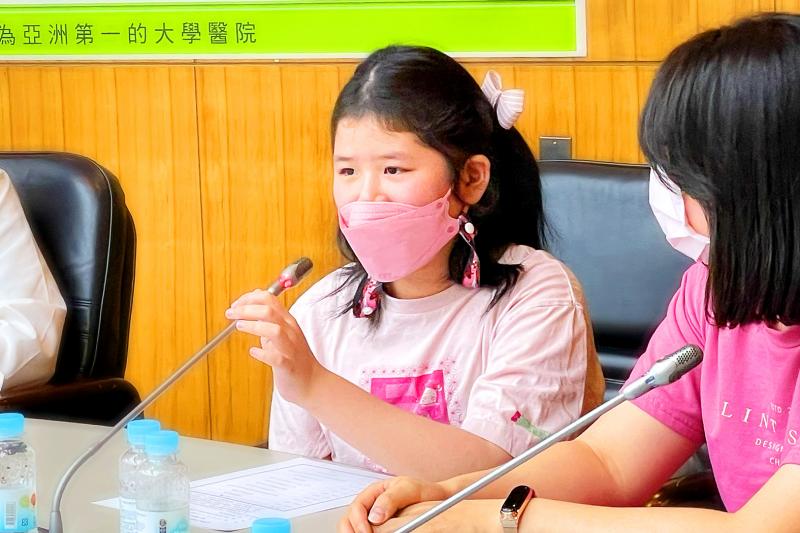A 10-year-old girl who has been battling leukemia for more than four years has become the first person in Taiwan to be successfully treated with a new form of immunotherapy, doctors at National Taiwan University Hospital (NTUH) said yesterday.
The child, identified only as Ting-ting (亭亭), was diagnosed with pediatric B-cell acute lymphoblastic leukemia at the age of six and was initially receiving targeted chemotherapy, her doctors told a news conference.
When her leukemia recurred last year, doctors recommended the CD19 chimeric antigen receptor (CAR) T-cell therapy — a immunotherapy treatment that was introduced in the past decade and had never previously been used successfully to treat a person with leukemia in Taiwan.

Photo: Chiu Chih-jou, Taipei Times
After an infusion of CD19 CAR T-cells in April, Ting-ting’s cancer went into complete remission, the doctors said, adding that she was recently able to spend her 10th birthday at home with her family.
CAR T therapies became prominent in 2012, when they were successfully used in a clinical trial to treat Emily Whitehead, a six-year-old American girl who had been diagnosed with leukemia.
In such therapies, immune cells called T-cells are taken from a patient’s blood and modified by adding a gene for a CAR, which helps them attach to the specific cancer cell antigen. They are then put back in the patient.
Ting-ting’s mother recalled the difficulty she had in explaining the cancer diagnosis to such a young child, telling the news conference that she eventually told her daughter it was “like having a cold” and would get better if she took her medicine.
She thanked her daughter’s medical team for discussing with her the option of CAR T-cell therapy, which she said allowed them to begin the treatment as soon as Ting-ting’s cancer recurred.
Cancer is the second-leading cause of death among children in Taiwan and leukemia accounts for a significant proportion, said Lee Wang-tso (李旺祚), director of NTUH’s Department of Pediatrics.
In the past, the options for treating pediatric leukemia have been limited mainly to chemotherapy, which can cause adverse reactions, and bone marrow transplants, which are difficult to arrange and sometimes require the patient to take immunosuppressant drugs indefinitely, Lee said.
Jou Shiann-tang (周獻堂), a doctor in the hospital’s Department of Hematology and Oncology, said that about 500 new pediatric leukemia cases are diagnosed in Taiwan each year.
About one-quarter of them are acute lymphoblastic leukemia and about 15 percent of such patients have adverse reactions to treatment or the cancer recurs, Jou said.
Ting-ting’s parents said that the CD19 CAR T-cell therapy has the potential to help other children.
However, the treatment is not covered by the National Health Insurance, which meant that they had to sell their home to pay the NT$10 million (US$334,571) it cost.
The National Health Insurance Administration is reviewing whether to cover such treatments in the future, the hospital said.

The manufacture of the remaining 28 M1A2T Abrams tanks Taiwan purchased from the US has recently been completed, and they are expected to be delivered within the next one to two months, a source said yesterday. The Ministry of National Defense is arranging cargo ships to transport the tanks to Taiwan as soon as possible, said the source, who is familiar with the matter. The estimated arrival time ranges from late this month to early next month, the source said. The 28 Abrams tanks make up the third and final batch of a total of 108 tanks, valued at about NT$40.5 billion

Two Taiwanese prosecutors were questioned by Chinese security personnel at their hotel during a trip to China’s Henan Province this month, the Mainland Affairs Council (MAC) said yesterday. The officers had personal information on the prosecutors, including “when they were assigned to their posts, their work locations and job titles,” MAC Deputy Minister and spokesman Liang Wen-chieh (梁文傑) said. On top of asking about their agencies and positions, the officers also questioned the prosecutors about the Cross-Strait Joint Crime-Fighting and Judicial Mutual Assistance Agreement, a pact that serves as the framework for Taiwan-China cooperation on combating crime and providing judicial assistance, Liang

A group from the Taiwanese Designers in Australia association yesterday represented Taiwan at the Midsumma Pride March in Melbourne. The march, held in the St. Kilda suburb, is the city’s largest LGBTQIA+ parade and the flagship event of the annual Midsumma Festival. It attracted more than 45,000 spectators who supported the 400 groups and 10,000 marchers that participated this year, the association said. Taiwanese Designers said they organized a team to march for Taiwan this year, joining politicians, government agencies, professionals and community organizations in showing support for LGBTQIA+ people and diverse communities. As the first country in Asia to legalize same-sex

MOTIVES QUESTIONED The PLA considers Xi’s policies toward Taiwan to be driven by personal considerations rather than military assessment, the Epoch Times reports Chinese President Xi Jinping’s (習近平) latest purge of the Chinese People’s Liberation Army (PLA) leadership might have been prompted by the military’s opposition to plans of invading Taiwan, the Epoch Times said. The Chinese military opposes waging war against Taiwan by a large consensus, putting it at odds with Xi’s vision, the Falun Gong-affiliated daily said in a report on Thursday, citing anonymous sources with insight into the PLA’s inner workings. The opposition is not the opinion of a few generals, but a widely shared view among the PLA cadre, the Epoch Times cited them as saying. “Chinese forces know full well that